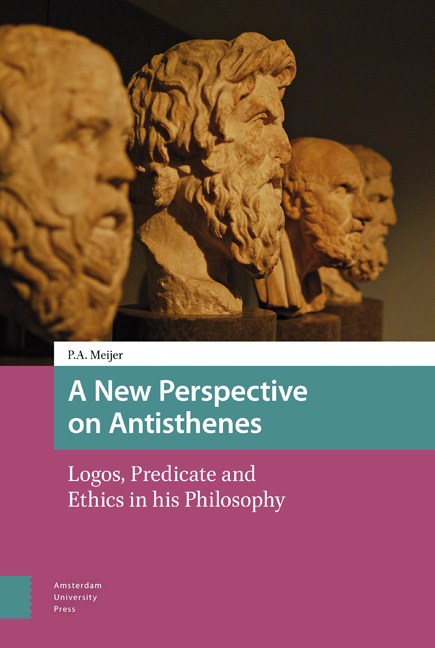Book contents
- Frontmatter
- Dedication
- Contents
- Preface
- Abbreviations
- Primary Sources – Editions Used
- Introduction
- Part I LOGOS AND PREDICATE
- Part II ANTISTHENES’ VIEWS ON THEOLOGY: HIS THEORETICAL APPROACH TO THE STUDY OF HOMER
- Part III ANTISTHENEAN ETHICS
- Epilogue: Antisthenes, an Assessment
- Appendix II The Speeches of Ajax and Odysseus
- Bibliography
- Concordance Giannantoni (SSR) – Caizzi (D.C.)
- Index
Chapter II - Antisthenes’ Scientific Approach to the Study of Homer
Published online by Cambridge University Press: 24 December 2020
- Frontmatter
- Dedication
- Contents
- Preface
- Abbreviations
- Primary Sources – Editions Used
- Introduction
- Part I LOGOS AND PREDICATE
- Part II ANTISTHENES’ VIEWS ON THEOLOGY: HIS THEORETICAL APPROACH TO THE STUDY OF HOMER
- Part III ANTISTHENEAN ETHICS
- Epilogue: Antisthenes, an Assessment
- Appendix II The Speeches of Ajax and Odysseus
- Bibliography
- Concordance Giannantoni (SSR) – Caizzi (D.C.)
- Index
Summary
Polytropos
Antisthenes’ view on the Homeric epithet polytropos, a word that played an important part in our discussion of the study of names, requires special attention. Antisthenes made Homer the subject of profound study, as we may deduce from many titles of his works. Homer was a favourite of tragedians and rhetors, many of whom did not approve of Odysseus’ behaviour. Antisthenes belonged to the group of Odysseus’ defenders. The explication of Homer's poems, he believed, could not be entrusted to rhapsodists, who do not really understand what they recite in performance. Odysseus’ behaviour is often condemned and Antisthenes implies as much, while seeking to protect him explicitly with reference to his Homeric epithet polytropos, ‘turning many ways’, ‘versatile’, ‘wily’, or ‘sly’. As Antisthenes says, this word ‘does no more praise than criticize Odysseus’. This statement is frequently explained by stating that, according to Antisthenes, Homer does not pass moral judgement in deploying polytropos. For the sake of clarity I shall divide the original rendering of the text on polytropos into three sections.
Section 1
Following Antisthenes’ thesis on the balanced meaning of polytropos (‘polytropos does no more praise than criticize Odysseus’), he states that Homer does not grant this epithet polytropos to noble heroes such as Agamemnon and Ajax. This might suggest that polytropos ought to be interpreted negatively. Antisthenes calls these heroes ‘uncomplicated, noble persons’ (ἁπƛοῦς ϰαὶ γϵννάδας); then he presents a sketch of Nestor's character starting with this characteristic, the uncomplicated nature of his manners. Nestor, he says, was a wise person who mainly had to deal with Agamemnon (note the verb ‘to deal [with]’ (συνόντα) which will play an important role in Antisthenes’ argument). Nestor's character was averse to using a ruse or cheating, and he had uncomplicated relations with Agamemnon and the other heroes. When he had good advice for the army, he gave it and did not hide it. Achilles’ character also avoided the use of a ruse or cheating; in fact, he disliked dissembling to such a degree that he considered ‘a person who says other things than he has in mind’ to be an enemy equal to death. The problem arises because polytropos is not applied to noble persons such as Agamemnon, Achilles, or Nestor, but is said of Odysseus.
- Type
- Chapter
- Information
- A New Perspective on AntisthenesLogos, Predicate and Ethics in his Philosophy, pp. 85 - 96Publisher: Amsterdam University PressPrint publication year: 2017

